|
|
|
Sort Order |
|
|
|
Items / Page
|
|
|
|
|
|
|
| Srl | Item |
| 1 |
ID:
136093
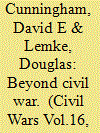

|
|
|
|
|
| Summary/Abstract |
A large quantitative cross-national literature examines why countries are more or less likely to experience civil war. Many of the theories motivating hypotheses about civil war are really arguments about when violence will happen without necessarily explaining why this violence is organized or targets the state. In this article, we examine how variables identified as causing civil war affect other forms of internal violence such as communal conflict, one-sided violence, riots, purges, and coups d'état. We find that factors such as ethnic fractionalization, population, terrain, economic development, and regime type similarly affect different measures of violence. We suggest two avenues for further research – expanding beyond civil war to study determinants of violence within countries more broadly and focusing more directly both theoretically and empirically on the specific determinants of civil war.
|
|
|
|
|
|
|
|
|
|
|
|
|
|
|
|
| 2 |
ID:
123019
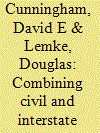

|
|
|
|
|
| Publication |
2013.
|
| Summary/Abstract |
Quantitative studies of conflict analyze either civil or interstate war. While there may be observable differences between civil and interstate wars, theories of conflict focus on phenomena-such as information asymmetries, commitment problems, and issue divisibility-that should explain both conflicts within and between states. In analyses of conflict onset, duration, and outcome combining civil and interstate wars, we find most variables have similar effects on both "types" of war. We thus question whether there is any justification for separate study of war types.
|
|
|
|
|
|
|
|
|
|
|
|
|
|
|
|
| 3 |
ID:
166752
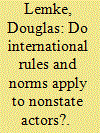

|
|
|
|
|
| Summary/Abstract |
The nonstate actors of interest in this article are territorial contenders: political entities that control populated territory, function like sovereign states but are not recognized as sovereign states by other members of the international system. Sometimes they are de facto states, sometimes they are rebel groups, sometimes they are neither of these, instead existing in control of territory with neither conflict against the sovereign state within whose borders they exist nor claims to a state of their own. New data about territorial contenders permit me to evaluate arguments about changing rules and norms in the international system. I find support for claims about the consequences of changing rules about which actors are recognized as sovereign states but not for claims about a norm against conquest after World War II. In the discussion section, I consider implications of these findings for future research.
|
|
|
|
|
|
|
|
|
|
|
|
|
|
|
|
| 4 |
ID:
101735


|
|
|
|
|
| Publication |
2011.
|
| Summary/Abstract |
Scholars debate whether Eurocentric theories of International Relations (IR) offer useful explanations of African international politics. They also debate the applicability of Eurocentric theories of state making for understanding African state making in the post-colonial era. I argue that theories like realism and war-and-state-making appear inconsistent with African political reality because when IR scholars apply these theories to Africa, they study the wrong actors. The 'right' actors for understanding these theories include not only the official states IR scholars traditionally analyse, but also all of the autonomous political entities that control territory, possess military resources, and struggle to survive under anarchy. I substantiate my claims about the usefulness and necessity of expanding the roster of actors studied with an historical narrative of the first six years of Congo's independence. During this time six autonomous political entities, in addition to the one official state, warred with each other, allied with each other, and struggled to make states.
|
|
|
|
|
|
|
|
|
|
|
|
|
|
|
|
| 5 |
ID:
046579
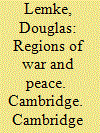

|
|
|
|
|
| Publication |
Cambridge, Cambridge University Press, 2002.
|
| Description |
xii, 235p.
|
| Standard Number |
0521007720
|
|
|
|
|
|
|
|
|
|
|
|
Copies: C:1/I:0,R:0,Q:0
Circulation
| Accession# | Call# | Current Location | Status | Policy | Location |
| 045456 | 327.172/LEM 045456 | Main | On Shelf | General | |
|
|
|
|
| 6 |
ID:
065793
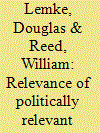

|
|
|
| 7 |
ID:
170306
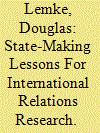

|
|
|
|
|
| Summary/Abstract |
Many of the central concerns of international relations—war, diplomatic relations, international trade and investment, and alliance politics—are also central to the state-making processes that are essential for the survival of states. The overlap between international relations and state making is profound but largely unrecognized. I present a framework emphasizing connections across these currently disparate areas of scholarship, thereby providing a more comprehensive basis for IR research. The framework I advance emphasizes the pursuit of capacity and legitimacy throughout a state’s existence, suggests new research topics, and raises new concerns about research design.
|
|
|
|
|
|
|
|
|
|
|
|
|
|
|
|
| 8 |
ID:
173780
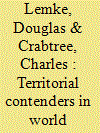

|
|
|
|
|
| Summary/Abstract |
Territorial contenders are political entities that control territory but differ from sovereign states in that they lack diplomatic recognition as legal members of the international system. One consequence of this difference is that international relations data sets have historically excluded information about them. And yet, as evidenced by the Islamic State’s impact on politics in the Middle East and beyond, territorial contenders are important actors in the international system. In this article, we introduce a new data set of territorial contenders, compare territorial contenders to other categories of territorial nonstate actors, explore how the presence of territorial contenders affects the probabilities of civil war and state failure, illustrate the conditions under which territorial contenders are more likely to emerge, and discuss a series of studies now possible given the existence of this new data set.
|
|
|
|
|
|
|
|
|
|
|
|
|
|
|
|
|
|
|
|
|